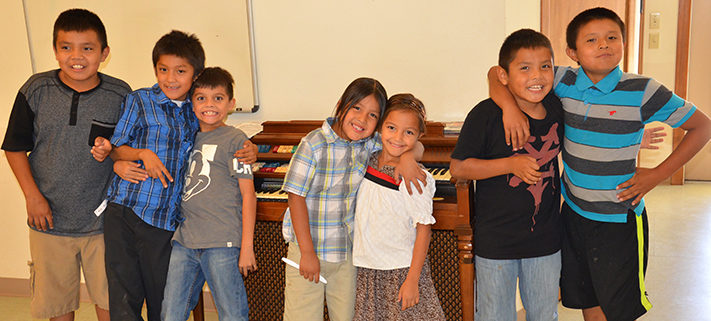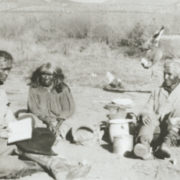Reaching Native Christians: Part 2
Despite challenges, the Word of the Lord continues to grow on the Apache reservation
Joseph M. Dietrich
In 1893 Missionaries Plocher and Adascheck first arrived in what is now called Peridot, Arizona, to begin sharing the good news of Jesus with the Apache people. They had many struggles. Where should they set up camp? How will they communicate? Who will translate? How do they overcome suspicion and mistrust toward the white man? By God’s grace, they began to overcome these and other obstacles. The mission took root. From Peridot it spread east to Bylas and north to Whiteriver. Some missionaries became masters in the Apache language. Schools and churches were built. People came to hear the good news of Jesus. Congregations were started. The Word of the Lord grew.
The challenges of today
Now it is 2018—125 years later. How is the Apache mission doing? What are the challenges and blessings of today? The challenges are much different than the ones the first missionaries encountered:
- Our pastors, teachers and congregational families are not perfect. We admit we are all still learning and growing—sometimes the hard way—by our mistakes. Gary Lupe, one of two Apache pastorson the reservation, says, “A long time ago the Apache needed the White man missionary to make all the decisions; he did a good job. But now, we have been strong in Christ for years, yet too many Apache people rely upon the missionary to make decisions. Our missionaries are working to let go and let members make decisions, and also our people must be empowered to stand up to run our churches. This is a struggle.”
- Our communities aren’t perfect, either. Broken homes, substance abuse, and unsupervised children are the new normal for many homes.When caregivers choose alcohol and drugs over electricity and food, children suffer.
- Gangs are active in our communities, and vandalism and theft are regular occurrences that plaguethe churches, schools, and homes of our members and missionaries.
- Unemployment (75%) and poverty (median family income is less than $20,000 per household) are multi-generational.Health issues plague our people; the average life expectancy is between 45 to 50 years old.
- Traditional Apache religion is still a powerful forcethat pulls people off the path that leads to eternal life. Medicine men actively practice witchcraft and have been successful in convincing many Apache people that this false religion is part of their identity as Natives. Christians continue to stumble in their walk of faith and distrust the message of the Bible as well as the messengers who bring it. “The writer to the Hebrews had to always tell people to not follow the old ways,” says Lupe. “I must always tell our Apache people to not go to the medicine man to find out who to blame for your problems or which rock or powder to buy to heal you or take away problems. Like the writer to the Hebrews, I too must always say, ‘Jesus is all we need. Jesus is the only way and the only power.’ ”
Yes, the Apache mission has challenges, and some of them are so big at times that our missionaries and teachers spend many weekly hours of ministry in unique ways of helping, counseling, transporting, praying with people out on the road and on the phone, talking with tribal security, and repairing buildings. It’s a struggle to the “regular daily work” one would think pastors and teachers are called to do.
Victories despite challenges
To keep these challenges in perspective, we turn to the book of Acts, a marvelous book that tells how Jesus’ disciples carried the gospel from Jerusalem to the ends of the earth. It tells of the magnificent march of the gospel through the powerful Roman Empire. It’s a happy book, a book of joyous victory. From beginning to end you can read how the Word of the Lord grew through Palestine and beyond.
But the story of Acts is not without its challenges. At every turn, there were struggles and threats to the ministry. Peter and John were put in prison. James was killed. Saul approved of Stephen’s death and started a great persecution. The Jewish leaders joined in on the persecution. They stoned Paul for speaking against traditional religion, the gods that the local people had worshiped for years. Arguments broke out between Jews and Gentile believers. Paul and Barnabas split up after a dispute. Unbelievers beat Paul and had him thrown into prison. People argued over who was the best pastor.
When you read Acts, you see struggle after struggle, blow after blow, hitting the apostles and believers.
When you spend time on the Apache reservation, you too can see struggle after struggle, blow after blow, hitting our missionaries and believers.
Still, the book of Acts is about the spread the gospel. It’s always about the Word of the Lord growing and going to the world. It’s victorious and joyous. When Paul was detained in Rome, Luke ended Acts with the following statement: “Therefore I want you to know that God’s salvation has been sent to the Gentiles and they will listen!” (28:28). Boldly and without hindrance Paul preached the kingdom of God and taught about the Lord.
The Word of the Lord grew in Paul’s day, and it is growing among the Apache today.
- Six missionary pastors serve more than 3,000 Apache members with approximately 1,000 worshipping innine congregations every Sunday.
- Almost 300 students attend our two K-8 schools, and 25 students attend our high school. They are taught by20 called teachers.
- TheApache Christian Training School program continues to build spiritual maturity and train people for service in God’s kingdom.
Six of our called pastors, evangelists, teachers, and ministry leaders are Apaches. “I love being a pastor and having that truth that I’m saved for myself, but mostly [I love] sharing it with my Apache people, working with the missionaries, and looking to share the gospel in many ways,” says Lupe, who has begun Wednesday evening street services at Gethsemane, Cibecue, to reach the community better. Lupe also works with lay evangelist Leonard Fall to record sermons in Apache that are broadcast on the radio
Another Apache pastor, Kirk Massey, is working to equip his members at Open Bible, Whiteriver, so they can better serve this one thousand-member congregation and its community.
And the Apache people are not content to serve only on the two current reservations in Arizona. They want to reach Native Americans on the 500-plus reservations throughout the United States, to follow the Great Commission as Jesus’ disciples did: “Go and make disciples of all nations . . .” (Matthew 28:19).
Because despite all our needs and challenges, we are assured that the Word of the Lord will grow, that God’s salvation has been sent to the Apache, and that they will listen.
Joseph Dietrich serves the San Carlos Apache Tribe as a missionary at Our Savior’s, Bylas, Arizona.
This is the second article in a three-part series on WELS mission work on the Apache reservations in Arizona.
Go to nativechristians.org to read more and to get 125th anniversary celebration updates.
SUBMIT YOUR STORY
Do you have a manuscript, idea, or story from your own life you’d like to share for use in Forward in Christ or on wels.net? Use our online form to share it to our editorial office for consideration.
SUBSCRIBE TO FORWARD IN CHRIST
Get inspirational stories, spiritual help, and synod news from Forward in Christ every month. Print and digital subscriptions are available from Northwestern Publishing House.
Author: Joseph M. Dietrich
Volume 105, Number 5
Issue: May 2018
Copyrighted by WELS Forward in Christ © 2021
Forward in Christ grants permission for any original article (not a reprint) to be printed for use in a WELS church, school, or organization, provided that it is distributed free and indicate Forward in Christ as the source. Images may not be reproduced except in the context of its article. Contact us




